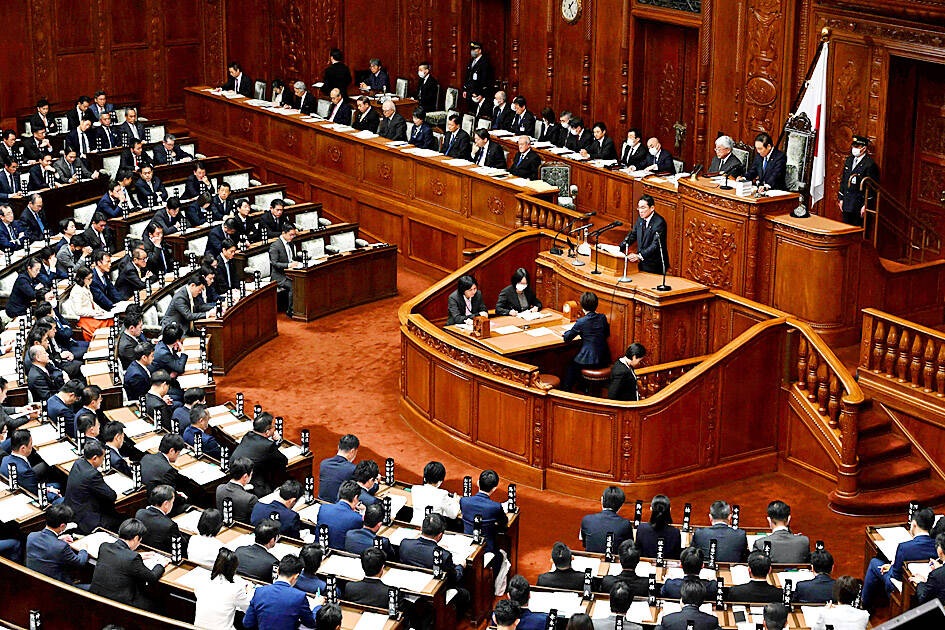Japanese Minister of Foreign Affairs Yoko Kamikawa yesterday told the National Diet that “peace and stability across the Taiwan Strait is highly important” to Tokyo.
Her remarks were the third time since 2022 that a Japanese foreign minister mentioned the importance of cross-strait peace and stability in their opening speeches to the new session of the Diet.
In 2002 and last year, then-Japanese minister of foreign affairs Yoshimasa Hayashi also spoke about Beijing’s military activities in waters near Taiwan and the firing of missiles into Japan’s exclusive economic zone.

Photo: AFP
Japanese Prime Minister Fumio Kishida, along with foreign, finance and economic ministers by tradition each give a policy speech at the opening of a new session at the Diet.
Kamikawa, who visited Ukraine last month, also told lawmakers that Japan “must not allow” the use of force to change the “status quo.”
Kishida did not mention Taiwan by name during his speech, but said that Japan would take “a necessary stance” in response to China’s attempt to impose unilateral changes in the East China Sea and South China Sea by force.
He urged Beijing to act responsibility.
Kishida and Kamikawa separately said that Japan continues to support mutually beneficial strategic relations with China.
They also called on China to lift an import ban on Japanese seafood, reiterating that Japan’s discharge of treated radioactive water from the disabled Fukushima Dai-ichi nuclear power plant has been proven to be safe.

Alain Robert, known as the "French Spider-Man," praised Alex Honnold as exceptionally well-prepared after the US climber completed a free solo ascent of Taipei 101 yesterday. Robert said Honnold's ascent of the 508m-tall skyscraper in just more than one-and-a-half hours without using safety ropes or equipment was a remarkable achievement. "This is my life," he said in an interview conducted in French, adding that he liked the feeling of being "on the edge of danger." The 63-year-old Frenchman climbed Taipei 101 using ropes in December 2004, taking about four hours to reach the top. On a one-to-10 scale of difficulty, Robert said Taipei 101

Nipah virus infection is to be officially listed as a category 5 notifiable infectious disease in Taiwan in March, while clinical treatment guidelines are being formulated, the Centers for Disease Control (CDC) said yesterday. With Nipah infections being reported in other countries and considering its relatively high fatality rate, the centers on Jan. 16 announced that it would be listed as a notifiable infectious disease to bolster the nation’s systematic early warning system and increase public awareness, the CDC said. Bangladesh reported four fatal cases last year in separate districts, with three linked to raw date palm sap consumption, CDC Epidemic Intelligence

US climber Alex Honnold left Taiwan this morning a day after completing a free-solo ascent of Taipei 101, a feat that drew cheers from onlookers and gained widespread international attention. Honnold yesterday scaled the 101-story skyscraper without a rope or safety harness. The climb — the highest urban free-solo ascent ever attempted — took just more than 90 minutes and was streamed live on Netflix. It was covered by major international news outlets including CNN, the New York Times, the Guardian and the Wall Street Journal. As Honnold prepared to leave Taiwan today, he attracted a crowd when he and his wife, Sanni,

Taiwanese and US defense groups are collaborating to introduce deployable, semi-autonomous manufacturing systems for drones and components in a boost to the nation’s supply chain resilience. Taiwan’s G-Tech Optroelectronics Corp subsidiary GTOC and the US’ Aerkomm Inc on Friday announced an agreement with fellow US-based Firestorm Lab to adopt the latter’s xCell, a technology featuring 3D printers fitted in 6.1m container units. The systems enable aerial platforms and parts to be produced in high volumes from dispersed nodes capable of rapid redeployment, to minimize the risk of enemy strikes and to meet field requirements, they said. Firestorm chief technology officer Ian Muceus said